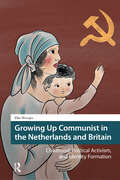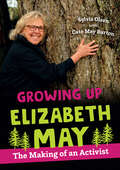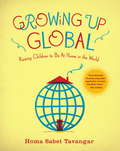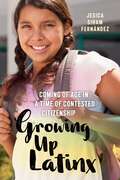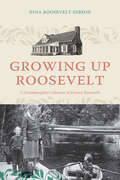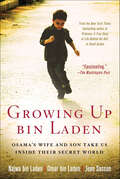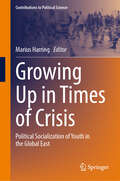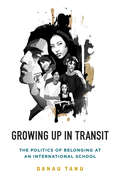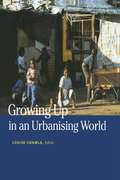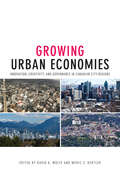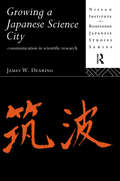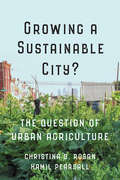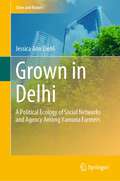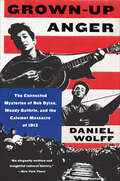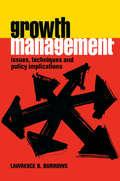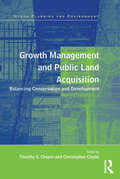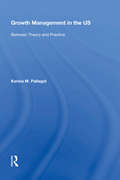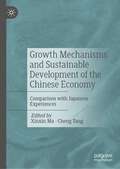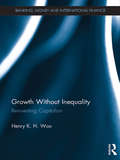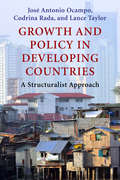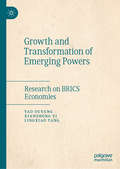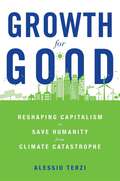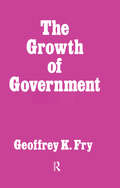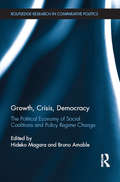- Table View
- List View
Growing Up Communist in the Netherlands and Britain: Childhood, Political Activism, and Identity Formation (Heritage and Memory Studies)
by Elke WeesjesGrowing Up Communist in the Netherlands and Britain: Childhood, Political Activism, and Identity Formation documents communists’ attempts, successful and otherwise, to overcome their isolation and to connect with the major social and political movements of the twentieth century. Communist parties in Britain and the Netherlands emerged from the Second World War expecting to play a significant role in post-war society, due to their domestic anti-fascist activities and to the part played by the Soviet Union in defeating fascism. The Cold War shattered these hopes, and isolated communist parties and their members. By analysing the accounts of communist children, Weesjes highlights their struggle to establish communities and define their identities within the specific cultural, social, and political frameworks of their countries.
Growing Up Elizabeth May: The Making of an Activist
by Sylvia OlsenBefore most people had thought about pollution, Elizabeth May was an anti-pollution activist. Before most people had heard about environmentalism, she was an environmentalist. As a young girl, Elizabeth was worried about the health of the planet. She believed it was her job to protect it. “I have to do something” became the principle she lived by. Growing Up Elizabeth May: The Making of an Activist tells the story of Elizabeth's life and what motivated her to take action for the environment. Co-written by Elizabeth's daughter Cate, this book is full of quotes, art and poetry from young activists as well as tips for making change in your own community. Part biography and part blueprint for activists in the making, this book shows how Elizabeth continues to inspire young people today to stand up for the planet.
Growing Up Global: Raising Children to Be At Home in the World
by Homa Sabet TavangarIn today’s increasingly interconnected world, how do we prepare our children to succeed and to become happy, informed global citizens? A mother of three, Homa Sabet Tavangar has spent her career helping governments develop globally oriented programs and advising businesses on how to thrive abroad. InGrowing Up Global, Tavangar shares with all of us her “parenting toolbox” to help give our children a vital global perspective. Whether you’re mastering a greeting in ten different languages, throwing an internationally themed birthday party, or celebrating a newfound holiday, Growing Up Global provides parents and children with a rich, exciting background for exploring and connecting with far-flung nations they may have only heard about on television. Inside you’ll discover • fun activities, games, and suggestions for movies, music, books, magazines, service activities, and websites for expanding your family’s worldview • simple explanations that will help your children grasp the diversity of world faiths • creative ways to gain geography literacy • handy lists of celebrations and customs that offer a fascinating look at how people from different cultures around the world live everyday life Growing Up Globalis a book that parents, grandparents, and teachers can turn to again and again for inspiration and motivation as they strive to open the minds of children everywhere.
Growing Up Latinx: Coming of Age in a Time of Contested Citizenship (Critical Perspectives on Youth)
by Jesica Siham FernándezWinner, Outstanding Scholarly Contribution Award of the Section on Children and Youth, given by the American Sociological AssociationFinalist for the 2021 C. Wright Mills Award, given by the Society for the Study of Social ProblemsLatinx children navigating identity, citizenship, and belonging in a divided America An estimated sixty million people in the United States are of Latinx descent, with youth under the age of eighteen making up two-thirds of this swiftly growing demographic. In Growing Up Latinx, Jesica Siham Fernández explores the lives of Latinx youth as they grapple with their social and political identities from an early age, and pursue a sense of belonging in their schools and communities as they face an increasingly hostile political climate.Drawing on interviews with nine-to-twelve-year-olds, Fernández gives us rare insight into how Latinx youth understand their own citizenship and bravely forge opportunities to be seen, to be heard, and to belong. With a compassionate eye, she shows us how they strive to identify, and ultimately redefine, what it means to come of age—and fight for their rights—in a country that does not always recognize them. Fernández follows Latinx youth as they navigate family, school, community, and country ties, richly detailing their hopes and dreams as they begin to advocate for their right to be treated as citizens in full. Growing Up Latinx invites us to witness the inspiring power of young people as they develop and make heard their political voices, broadening our understanding of citizenship.
Growing Up Roosevelt: A Granddaughter's Memoir of Eleanor Roosevelt (Excelsior Editions)
by Nina Roosevelt GibsonWhen Nina Roosevelt was just seven years old, her family moved from California to live with her grandmother at the small cottage, Val-Kill, in Hyde Park, New York. It was at Val-Kill Farm that Nina shared her childhood years with her remarkable grandmother, the woman who would change her life. To Nina, she was Grandmère, but, to most everyone else, she was Eleanor Roosevelt. Few people realize how important Val-Kill was for Eleanor Roosevelt. Returning "home again" nourished her, allowed her time for reflection, planning, and rejuvenation so that she could continue pouring her heart and soul into the needs of so many people the world over.Growing Up Roosevelt gives an intimate picture of life at Val-Kill as well as Nina's wide-ranging experiences traveling as a teenager with her grandmother. Included are portraits of the family, staff, famous friends, people in need, and world leaders as disparate as Nikita Khrushchev, Haile Selassie, and John F. Kennedy. This book will appeal to anyone interested in the life and times of Eleanor Roosevelt, her work as a trailblazing political and feminist leader, and the intimate behind-the-scenes details that only her granddaughter can tell.
Growing Up bin Laden: Osama's Wife and Son Take Us Inside Their Secret World
by Jean Sasson Najwa bin Laden Omar bin LadenThe New York Times calls GROWING UP BIN LADEN: "The most complete account available of the terrorist's immediate family." (May 15, 2011) A true story that few ever believed would come to light, GROWING UP BIN LADEN uncovers startling revelations and hidden secrets carefully guarded by the most wanted terrorist of our lifetime, Osama bin Laden. "I was not always the wife of Osama bin Laden. Once I was an innocent child dreaming little girl dreams..."Thus begins this powerful story as Najwa bin Laden, who married her cousin Osama bin Laden at the age of 15 to become his first wife and the mother to eleven of his children, and her son, Omar bin Laden, the fourth-born son of Osama bin Laden. Together, mother and son tell an extraordinarily powerful story of a man hated by so many, yet both loved and feared by his family, with spine-tingling details about the life and times of the man they knew as a husband and father, including: - Osama's disapproval of modern conveniences, including electricity and medicine- His plan to toughen up his sons by taking them into the desert without food or water- Transporting his wives and children to the rough terrain of Sudan, where he claimed to be preparing them for attacks from western powers, commanding them to dig holes, and to sleep in those holes, allowing nothing more than sand and twigs for cover- Omar's horror at the rape and murder of a boy his own age, by members of a jihadist group living among them in the Sudan. - What happened in the bin Laden home in Jeddah, Saudi Arabia, on the morning of September 11, 2001, and Omar's surprise phone call with his mother, who escaped from Afghanistan only two days before the shattering events that killed so many innocent peopleSince September 11, 2001, journalists have struggled to uncover carefully guarded information about Osama's private life. Until now, Osama Bin Laden's family members have not cooperated with any writers or journalists. Now, with unprecedented access and insight, Jean Sasson, author of the bestselling Princess: A True Story Behind the Veil in Saudi Arabia, takes us inside the secret world of Osama bin Laden.
Growing Up in Times of Crisis: Political Socialization of Youth in the Global East (Contributions to Political Science)
by Marius HarringThis book discusses the living conditions and resulting political attitudes and participation patterns of young people, especially in the countries of the “Global East”—regions of the world that have so far received little public attention—and which subjects growing up in these countries to an in-depth analysis. Today’s youth is coming of age in a climate of social disparity and heterogeneous living circumstances. Amid the economic and political uncertainty in many of the world’s crisis countries, adolescents are faced with a multiplicity of challenges which may manifest in social exclusion, unequal access to education, and high youth unemployment rates. The political circumstances from which these effects arise are varied in nature and include attempts at democratization and repressive tendencies in Arab states, financial crises in Southern Europe, and the growing alienation of South-Eastern Europe and the countries of the former Soviet Union from the European Union as a result of disappointed expectations. The empirical data basis of the individual articles is provided by current country-specific youth studies. The book is divided into three sections. Part One outlines the differences in the economic and political status of young people in selected countries. Part Two focuses on the political and social involvement of adolescents. Finally, Part Three discusses adolescents’ responses to the situations in their home countries. A detailed presentation of the political behavior of young people in crisis countries, this book will be useful to students and researchers interested in political science, public participation, youth welfare, education, and social work.
Growing Up in Transit: The Politics of Belonging at an International School
by Danau TanuIn this compelling study of the children of serial migrants, Danau Tanu argues that the international schools they attend promote an ideology of being "international" that is Eurocentric. Despite the cosmopolitan rhetoric, hierarchies of race, culture and class shape popularity, friendships and romance on campus. By going back to high school for a year, Tanu befriended transnational youth, often called "Third Culture Kids", to present their struggles with identity, belonging and internalized racism in their own words. The result is the first engaging, anthropological critique of the way Western-style cosmopolitanism is institutionalized as cultural capital to reproduce global socio-cultural inequalities.
Growing Up in an Urbanizing World
by Louise ChawlaHalf the world's children live in cities and the proportion is growing. Their environment critically determines their futures and the world they will make as adults. This text, by an interdisciplinary team of international child-environment authorities, explores how crucial the relationship of the young and their surroundings is. Covering eight countries, it shows the enormous benefits - for them, for the wider society and for the future - of involving children, especially from underprivileged communities, in planning and implementing urban improvements. It continues and updates Kevin Leech's pioneering 1970s MIT project, Growing Up in Cities.
Growing Urban Economies: Innovation, Creativity, and Governance in Canadian City-Regions
by David A. Wolfe Meric S. GertlerEven in a globalizing, knowledge-based economy, cities remain engines of growth, innovation, and diversity. Increasingly, they are also active participants in the creation of the social and political conditions necessary to create a thriving community. The Innovation, Creativity, and Governance in Canadian City-Regions series is a focused analysis of how developments at the local and regional level affect these three key determinants of future prosperity. Growing Urban Economies summarizes its conclusions in a single volume that presents an overview of the evidence and its implications.A rich and nuanced analysis of the interplay of social, political, and economic factors in thirteen Canadian city-regions, large and small, this collection integrates research focusing on innovation, creativity and talent-retention, and governance in order to understand the distinctive experience of each region. A valuable cross-section of city-region development in a variety of circumstances, Growing Urban Economies offers important insights into the way in which local conditions affect urban economies around the world.
Growing a Japanese Science City: Communication in Scientific Research (Nissan Institute/Routledge Japanese Studies)
by James W. DearingTsukuba Science City is the world's most ambitious attempt to `turbocharge' scientific collaboration. James W. Dearing looks at the political and economic context within which the plans for Tsukuba were laid, how those plans changed during the process of implementation, and at the functioning of Tsukuba today. Tsukuba is vitally important to Japan's basic scientific research . Its history, its failures and successes need to be understood by governments and businesses planning for scientific research and economic growth.
Growing a Sustainable City?: The Question of Urban Agriculture
by Christina D. Rosan Hamil PearsallUrban agriculture offers promising solutions to many different urban problems, such as blighted vacant lots, food insecurity, storm water runoff, and unemployment. These objectives connect to many cities’ broader goal of “sustainability,” but tensions among stakeholders have started to emerge in cities as urban agriculture is incorporated into the policymaking framework.Growing a Sustainable City? offers a critical analysis of the development of urban agriculture policies and their role in making post-industrial cities more sustainable. Christina Rosan and Hamil Pearsall’s intriguing and illuminating case study of Philadelphia reveals how growing in the city has become a symbol of urban economic revitalization, sustainability, and – increasingly – gentrification. Their comprehensive research includes interviews with urban farmers, gardeners, and city officials, and reveals that the transition to “sustainability” is marked by a series of tensions along race, class, and generational lines. The book evaluates the role of urban agriculture in sustainability planning and policy by placing it within the context of a large city struggling to manage competing sustainability objectives. They highlight the challenges and opportunities of institutionalizing urban agriculture into formal city policy. Rosan and Pearsall tell the story of change and growing pains as a city attempts to reinvent itself as sustainable, livable, and economically competitive.
Grown in Delhi: A Political Ecology of Social Networks and Agency Among Yamuna Farmers (Cities and Nature)
by Jessica Ann DiehlThis book explores how power relationships, measured through qualitative social network analysis, impact planning participation and livelihood strategies of a marginalized group of farmers cultivating the Yamuna River floodplain in Delhi, India. Through an in-depth study of 165 farming households facing land development, this book offers insights from the ground-up into how social dynamics enable and constrain agency. A novel mixed-methods approach was used to measure social networks and access to resources based on the different types of people farmers might interact with as part of their livelihoods: hired laborers, vendors, other farmers, etc. Digging deeper into social network patterns, typologies of power are illustrated as they manifest household agency through diverse pathways. More broadly, a political ecology lens is used to link together the multiple and fragmented Yamuna farmers’ stories with broader social, ecological, infrastructural, and economic contexts to suggest future directions for inquiry and policy related to localized urban food systems and sustainable development. This monograph will be of interest to academic faculty and graduate students in critical geography, cultural anthropology, food studies, landscape architecture/urban planning, and sociology.
Grown-Up Anger: The Connected Mysteries of Bob Dylan, Woody Guthrie, and the Calumet Massacre of 1913
by Daniel WolffA brilliantly intertwined account of two revolutionary musicians, a miners’ strike, and a deadly tragedy: “Reads like a historical detective story.” —The New York Times Book ReviewAt thirteen, when he first heard Bob Dylan’s “Like a Rolling Stone,” Daniel Wolff recognized the sound of anger. When he later discovered “Song for Woody,” Dylan’s tribute to folk musician Woody Guthrie, Wolff fixed on it as a clue to a distinctive mix of rage and compassion. That clue led back to Guthrie’s “1913 Massacre”—a memorial song about the horrific conclusion to a union Christmas party in Calumet, Michigan.Following the trail from Dylan to Guthrie to a tragedy that claimed seventy-four lives, Wolff found himself tracing a century-long line of anger. From America’s early industrialized days up to the present, the battle over economic justice keeps resurfacing: on a freight car in California, on a joyride through New Orleans, in a snowy field in Michigan. At the stunning conclusion—as the mysteries of Dylan, Guthrie, and the 1913 tragedy connect—the reader discovers a larger story, purposely distorted and buried in time.A tour de force of storytelling years in the making that chronicles the struggles between the haves and have-nots, Grown-Up Anger is both a dual biography of two legendary songwriters and a murder mystery. It also serves as a history of labor relations and socialism, big business and greed in twentieth-century America—all woven together in one epic saga.“A fascinating and relevant whirlwind examination of music, economic injustice, and two American icons.” —Booklist (starred review)“A masterful tale of music, social, and economic history . . . A dazzling, richly researched story impeccably told.” —Kirkus Reviews (starred review)
Growth Management
by Lawrence B. BurrowsThere are specific topics which, in microcosm, bring together many of the strands of a whole society. The pressures at work in responding to the problems involved in these topics both in implementing and retarding their resolution, provide a unique insight into the strains of our time. In many ways, the subject of growth controls is a prime exemplar of this species. Grouped under this rubric are all the environmental concerns which are increasingly prominent: the natural limits of land-holding capacity, the trade-offs between intensive land use, and the physical limitations of earth and space. But these elements, while far from being defined, are much more finite than the particulars at the other end of the spectrum that of the character and individual substance and way of life, which revolve around the level of intensity of land use. For example, as we near the end of the twentieth century, an increasing demand is heard for a return to the simpler, more bucolic environment. Just as the suburb replaced the city as the prime location so the suburb in turn finds it very difficult to compete against the lures of the countryside. The drive towards exurbia, and with is greater levels of decentralization, and with it greater levels of decentralization becomes a dominant theme, at least for the affluent. All these and many other elements are at work within the simple title of Growth Management.
Growth Management and Public Land Acquisition: Balancing Conservation and Development (Urban Planning And Environment Ser.)
by Christopher CouttsBringing together a team of national experts, this volume offers a detailed look at the links between public land acquisition programs and efforts to yield smart growth outcomes in the USA. Both public land acquisition programs and state and local growth management efforts have been examined in detail, but while there is growing recognition that land acquisition can play an important role in smart growth outcomes, there has so far been little research into the nexus of these areas of public policy. This book investigates various aspects of the land acquisition-smart growth linkage and describes model programs and makes recommendations for the adoption of land acquisition efforts nationally and internationally. It will appeal to practising planners, policy makers, public officials, and citizen groups, as well as academics of urban planning, environmental studies, geography and other disciplines which examine issues of urban sprawl.
Growth Management in the US: Between Theory and Practice (Urban Planning And Environment Ser.)
by Karina PallagstUrban sprawl is one of the key planning issues facing many US cities, leading to the creation and adoption of a variety of approaches to control growth. However, many growth management ideas do not align well with the growth-promoting planning traditions of the US, which historically have been dominated by the concerns of the market, the landowner and the developer. Illustrated by a study of the San Francisco Bay Area, this book puts forward an innovative theoretical approach to growth management, analyzing it as a tool for controlling land use expansion in the US. This region makes a particularly useful study as it has encountered long term growth pressures, complex land use demands and the application of a wide variety of growth management approaches over the past few decades. Using empirical, qualitative analysis, the book examines which growth management activities have actually been put into practice and which have proved successful and questions how such a planning approach functions in today‘s complex and multi-faceted planning paradigms. It concludes by stressing the different notions of interdependence in growth management: regional interdependence, interdependence between stakeholders and interdependence in planning theory.
Growth Mechanisms and Sustainable Development of the Chinese Economy: Comparison with Japanese Experiences
by Xinxin Ma Cheng TangWhat can Chinese economists learn from the Japanese economic boom and subsequent stagnation? This project aims to institutionally and empirically investigate the growth mechanism and determinants of sustainable development in China compared with Japanese experiences. This is the first challenge in conducting a comparative study on China and Japan’s economic growth and development. We aim to investigate the economic system transition and its influence on the Chinese and Japanese economy from macroeconomic and microeconomic perspectives. This book will interest economists, scholars of comparative politics, and scholars of China or Japan's economic development.
Growth Without Inequality: Reinventing Capitalism (Banking, Money and International Finance)
by Henry K. WooMany years on after the 2007–8 financial crisis, most developed nations still find themselves in a state of weak recovery, high debt pile-up and distributive disparity. The intriguing question that we face is whether the golden days of modern capitalism are over, or if capitalism is just undergoing another period of adjustment characteristic of its past. What is disheartening is that the twin economic goals of sustainable growth and equality, which the world has now come to recognise as of paramount importance but mutually conflicting, remain, more now than ever, illusive and unattainable. Growth Without Inequality attempts to address this issue and to provide a pragmatic solution especially for nations in the current policy gridlock. By offering a unified framework of factors that drive growth, it shows how growth also gives rise to an array of "anomalous market forms" (defined by different degrees of value and risk visibility) that subvert distributive equity between labour and capital. It debunks both the pure free market solution and the mixed economy approach on the ground that they fail to arrest the growth propelling yet subversive power inherent in the "corporate forms" under the present capitalistic regime. Having shown that effective reform can hardly take place within the system itself, this book proposes to build a separate sector (Economy II) and partition it from the existing system (Economy I). The solution is easy to implement and quick to take effect. By one single stroke, this "Non-Marxist" solution can happily achieve the ideals of both "competitive capitalism" and "egalitarian socialism".
Growth and Policy in Developing Countries: A Structuralist Approach
by Lance Taylor Jose Antonio Ocampo Codrina RadaEconomic structuralists use a broad, systemwide approach to understanding development, and this textbook assumes a structuralist perspective in its investigation of why a host of developing countries have failed to grow at 2 percent or more since 1960. Sensitive to the wide range of factors that affect an economy's strength and stability, the authors identify the problems that have long frustrated growth in many parts of the developing world while suggesting new strategies and policies to help improve standards of living. After a survey of structuralist methods and post-World War II trends of global economic growth, the authors discuss the role that patterns in productivity, production structures, and capital accumulation play in the growth dynamics of developing countries. Next, it outlines the evolution of trade patterns and the effect of the terms of trade on economic performance, especially for countries that depend on commodity exports. The authors acknowledge the structural limits of macroeconomic policy, highlighting the negative effects of financial volatility and certain financial structures while recommending policies to better manage external shocks. These policies are then further developed through a discussion of growth and structural improvements, and are evaluated according to which policy options-macro, industrial, or commercial& mdash;best fit within different kinds of developing economies.
Growth and Policy in Developing Countries: A Structuralist Approach (Initiative for Policy Dialogue at Columbia: Challenges in Development and Globalization)
by Lance Taylor José Antonio Ocampo Codrina RadaEconomic structuralists use a broad, systemwide approach to understanding development, and this textbook assumes a structuralist perspective in its investigation of why a host of developing countries have failed to grow at 2 percent or more since 1960. Sensitive to the wide range of factors that affect an economy's strength and stability, the authors identify the problems that have long frustrated growth in many parts of the developing world while suggesting new strategies and policies to help improve standards of living.After a survey of structuralist methods and post-World War II trends of global economic growth, the authors discuss the role that patterns in productivity, production structures, and capital accumulation play in the growth dynamics of developing countries. Next, it outlines the evolution of trade patterns and the effect of the terms of trade on economic performance, especially for countries that depend on commodity exports. The authors acknowledge the structural limits of macroeconomic policy, highlighting the negative effects of financial volatility and certain financial structures while recommending policies to better manage external shocks. These policies are then further developed through a discussion of growth and structural improvements, and are evaluated according to which policy options-macro, industrial, or commercial-best fit within different kinds of developing economies.
Growth and Transformation of Emerging Powers: Research on BRICS Economies
by Yao Ouyang Xianzhong Yi Lingxiao TangThis book offers a quantitative and qualitative look at the much-discussed BRICS—Brazil, Russia, India, China and South Africa—and explores how their economic ascent might cause global economic realignments in the 21st century. Providing a Chinese perspective on how the global realignment might impact strategic choices and a data-driven approach to the similarities and differences within the so-called BRICS group, this book will be of great interest to economists, international banking professionals, and political forecasters.
Growth for Good: Reshaping Capitalism to Save Humanity from Climate Catastrophe
by Alessio TerziFrom the front lines of economics and policymaking, a compelling case that economic growth is a force for good and a blueprint for enrolling it in the fight against climate change. Economic growth is wrecking the planet. It’s the engine driving climate change, pollution, and the shrinking of natural spaces. To save the environment, will we have to shrink the economy? Might this even lead to a better society, especially in rich nations, helping us break free from a pointless obsession with material wealth that only benefits the few? Alessio Terzi takes these legitimate questions as a starting point for a riveting journey into the socioeconomic, evolutionary, and cultural origins of our need for growth. It’s an imperative, he argues, that we abandon at our own risk. Terzi ranges across centuries and diverse civilizations to show that focus on economic expansion is deeply interwoven with the human quest for happiness, well-being, and self-determination. Growth, he argues, is underpinned by core principles and dynamics behind the West’s rise to affluence. These include the positivism of the Enlightenment, the acceleration of science and technology and, ultimately, progress itself. Today growth contributes to the stability of liberal democracy, the peaceful conduct of international relations, and the very way our society is organized through capitalism. Abandoning growth would not only prove impractical, but would also sow chaos, exacerbating conflict within and among societies. This does not mean we have to choose between chaos and environmental destruction. Growth for Good presents a credible agenda to enroll capitalism in the fight against climate catastrophe. With the right policies and the help of engaged citizens, pioneering nations can set in motion a global decarbonization wave and in parallel create good jobs and a better, greener, healthier world.
Growth of Government
by Geoffrey K FryFirst Published in 1978. This is an historical study of the growth of government in Britain. It was begun in 1970, and that is the point down to which the study is really taken. The most recent developments in government necessarily receive only limited attention, and the author hopes to publish separately a fuller study of administrative change in Britain since the 1950s.
Growth, Crisis, Democracy: The Political Economy of Social Coalitions and Policy Regime Change (Routledge Research in Comparative Politics)
by Hideko Magara and Bruno AmableSince the global financial crisis of 2008, advanced economies have been making various efforts to overcome the economic impasse. While the contrast between the countries that have escaped from the crisis relatively quickly and those still suffering from serious problems is becoming clearer, a new economic crisis stemming from newly emerging economies has again impacted advanced economies. In retrospect, both leftist and rightist governments in advanced economies pursued expansive macroeconomic and welfare policies from the post-WWII period to the oil shocks of the 1970s. While we recognise that the particular policy regime in this ‘Golden Decades’ during which the left and the right implemented similar policies cross-nationally, were characterised by outstanding economic growth in each country, the specific growth patterns varied across countries. Different social coalitions underpinned different growth models. This book is premised on tentative conclusions that Magara and her research collaborators have reached as a result of three years of study related to our previous project on economic crises and policy regimes. Recognising the need to analyse fluid and unstable situations, we have set up a new research design in which we emphasise political variables—whether political leaders and citizens can overcome the various weaknesses inherent in democracy and escape from an economic crisis by establishing an effective social coalition. A new policy regime can be stable only if it is supported by a sufficiently large coalition of social groups whose most important policy demands are satisfied within the new policy regime.
